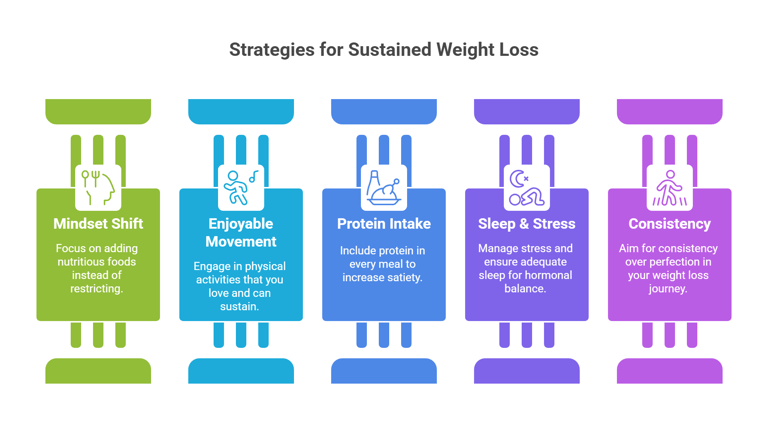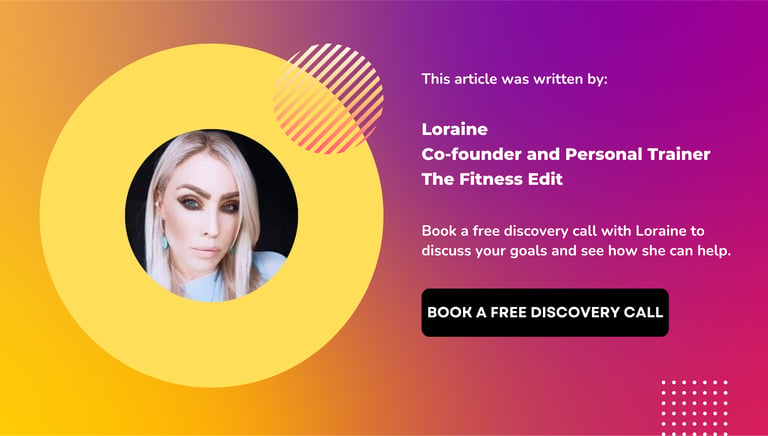Sustainable Weight Loss: Why Quick Fixes Fail and What Actually Works
Learn why 95% of diets fail and discover the sustainable approach that works. Evidence-based strategies from certified trainers with 20+ years of experience.
Loraine B
6/28/20256 min read


Picture this: Your friend just completed their third "miracle" diet this year, lost 8 kilograms in two weeks, and is already talking about the next trendy weight loss challenge. Sound familiar? If you're nodding along, you're witnessing one of the most predictable patterns in the fitness world.
Here's the uncomfortable truth that nobody wants to talk about: 95% of diets fail, and most people who lose weight through quick fixes end up heavier than when they started. But before you throw in the towel completely, let me share what actually works for long-term success.
The Real Reason Quick Fixes Don't Work
Think about your last diet attempt. Maybe it promised to help you drop two dress sizes in a month, or perhaps it involved drinking mysterious shakes for every meal. These approaches share one fatal flaw: they're completely unsustainable.
When you drastically cut calories or eliminate entire food groups, your body goes into survival mode. Your metabolism slows down, hunger hormones spike, and your body becomes incredibly efficient at storing fat the moment you return to normal eating. It's like your body has a built-in alarm system that screams "famine!" whenever you try to starve it into submission.
Here's what typically happens with crash diets:
Week 1-2: Rapid water weight loss creates excitement and motivation.
Week 3-4: Weight loss stalls, energy crashes, cravings intensify.
Week 5-8: Social situations become impossible, willpower depletes.
Week 9+: Complete rebound, often gaining back more weight than originally lost.
Research shows that obesity interventions typically result in early rapid weight loss followed by a weight plateau and progressive regain. This isn't a character flaw or lack of willpower. It's basic human biology working exactly as designed.
What Sustainable Weight Loss Actually Looks Like
Sustainable weight loss isn't about perfection or dramatic transformations. It's about creating small, consistent changes that compound over time. Instead of losing 10 kilograms in 30 days, successful long-term weight loss typically involves losing 0.5-1 kilogram per week over several months.
Think of it like learning to drive. You didn't go from never touching a steering wheel to racing on the highways overnight. You started with the basics, practiced consistently, and gradually built confidence and skill. Weight loss works the same way.
The Sustainable Approach:
Create a moderate calorie deficit (300-500 calories per day)
Focus on whole, unprocessed foods 80% of the time
Include foods you actually enjoy
Build movement into your daily routine
Prioritize sleep and stress management
Allow for flexibility and real-life situations
Pillar 3: Protein at Every Meal
Higher protein intake leads to increased satiety and reduced calorie intake. Protein keeps you full longer, helps preserve muscle mass during weight loss, and requires more energy to digest than carbs or fats.
Aim for 20-30 grams of protein at each meal. This might look like eggs with breakfast, chicken in your lunchtime salad, or lentils in your dinner curry. Local South African options like biltong, boerewors (in moderation), or sosaties can fit perfectly into a balanced approach.
Pillar 4: Sleep and Stress Management
This is where most people drop the ball. You can eat perfectly and exercise religiously, but if you're stressed and sleep-deprived, your hormones will sabotage your efforts every time.
Poor sleep increases hunger hormones and decreases the ones that signal fullness. Chronic stress elevates cortisol, which promotes fat storage around your midsection. Even a 10% loss of weight creates noticeable changes in blood pressure and blood sugar control, but these benefits are harder to achieve when stress and sleep issues are present.
Pillar 5: Consistency Over Perfection
The biggest difference between successful long-term weight loss and chronic dieters? Successful people aim for good enough, not perfect. They follow their plan 80% of the time and don't let the other 20% derail their progress.
Had pizza on Friday night? No problem. Got back on track Saturday morning. Missed three workouts in a row due to work deadlines? Started fresh the following week without guilt or self-punishment.
Real-World Application in South Africa
Living in South Africa presents unique challenges and opportunities for sustainable weight loss. Our braai culture, love for boerewors and pap, and social gatherings centered around food require a flexible approach.
Instead of avoiding braais entirely, make strategic choices. Load up on salads and grilled vegetables. Choose lean proteins. Limit the starchy sides. Enjoy a boerewors roll if you want one, but make it special rather than standard.
Our beautiful coastline and mountain ranges provide incredible opportunities for enjoyable movement. Whether it's surfing in Jeffreys Bay, hiking Table Mountain, or beach walks along the Garden Route, we have natural gyms everywhere.
Local markets offer amazing fresh produce year-round. Embrace seasonal eating with naartjies in winter, watermelon in summer, and the incredible variety of vegetables available at affordable prices.
Pillar 1: Mindset Shift from Restriction to Addition
Instead of constantly telling yourself what you can't eat, focus on adding nutritious foods to your day. Replace morning toast with a protein-rich breakfast. Add vegetables to every meal. Include a piece of fruit with your afternoon snack.
This simple shift changes your relationship with food from punishment to nourishment. You're not depriving yourself; you're upgrading your fuel.
Pillar 2: Movement That You Actually Enjoy
Increased physical activity is an essential component of a comprehensive weight-reduction strategy, and one of the best predictors of success in long-term management is the ability to develop and sustain an exercise program.
The key word here is "sustain." If you hate running, stop forcing yourself to run. If you love dancing, dance. If hiking makes you happy, hit the trails. The best exercise is the one you'll do consistently for years, not the one that burns the most calories for a few weeks.
Key References
Maintenance of lost weight and long-term management of obesity - PMC
The Weight Loss Trap: Why Your Diet Isn't Working - Time Magazine
Diet Failure Statistics 2025 - Gitnux
Weight-Loss and Maintenance Strategies - NCBI Bookshelf
Evidence-Based Weight Loss Strategies That Actually Work - World Trends
Diet & Weight Loss - Harvard Health - Harvard Health
Optimal Diet Strategies for Weight Loss and Weight Loss Maintenance - PMC
Healthy strategies for successful weight loss and weight maintenance: a systematic review - PubMed
The Truth About Plateaus
Every successful weight loss journey includes plateaus. Your body is incredibly smart and will adapt to whatever you're doing. When weight loss stalls for 2-3 weeks, it's not failure; it's biology.
This is when most people panic and either give up or try something more extreme. Instead, view plateaus as your body's way of saying "Let me catch up and adjust to this new normal." Sometimes you need to eat slightly more to restart your metabolism. Sometimes you need to change your exercise routine. Sometimes you just need patience.
Building Your Sustainable Plan
Ready to ditch the quick fixes and build something that lasts? Start with these three foundational steps:
Week 1-2: Focus solely on eating protein at every meal and drinking more water. Don't change anything else yet.
Week 3-4: Add 10-15 minutes of movement you enjoy, three times per week. This could be dancing in your living room, walking your dog, or doing bodyweight exercises.
Week 5-6: Begin tracking your food intake, not for restriction, but for awareness. You can't improve what you don't measure.
From there, add one small change every two weeks. The goal is progress, not perfection.
Why This Approach Works Long-Term
Simply replacing unhealthy foods with healthy ones, not for a few weeks but forever, will help achieve weight loss while offering numerous other benefits. This isn't about following someone else's meal plan or workout routine. It's about developing skills and habits that work within your real life.
When you build sustainable habits slowly, they become part of who you are rather than something you're temporarily doing. You're not "on a diet"; you're someone who prioritizes their health. You're not "doing a workout program"; you're someone who moves their body regularly. This identity shift is what makes the difference between short-term results and lifelong transformation.
Quick fixes fail because they're based on restriction, perfection, and unsustainable practices. Sustainable weight loss succeeds because it's based on addition, flexibility, and gradual habit formation.
Stop looking for the magic bullet and start building the skills that will serve you for life. Your future self will thank you for choosing the path that actually works, even if it takes a little longer to get there.
Remember, the goal isn't just to lose weight. It's to build a life where maintaining a healthy weight feels natural and effortless. That's the difference between a temporary fix and a permanent transformation.
Further reading on TheFitnessEdit.co.za: '7 Weight Loss Habits That Keep You Looking 10 Years Younger.'
You can also read about 'Why Online Personal Training is The Future of Fitness and Weight Loss.'




The Five Pillars of Long-Term Success
After working with hundreds of clients over the past decade, I've identified five key strategies that separate successful weight loss maintainers from the yo-yo dieters.


© 2025 Elevate Wellness Co. Pty Ltd. All rights reserved




